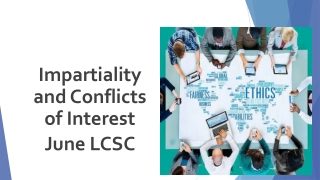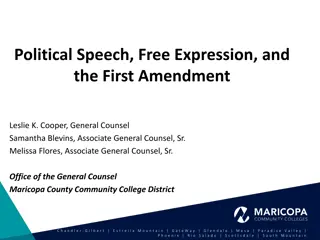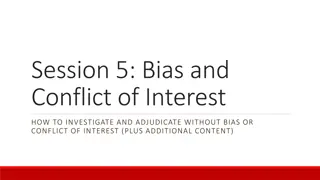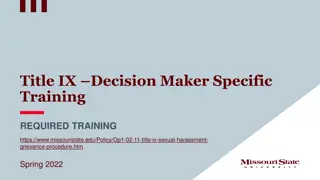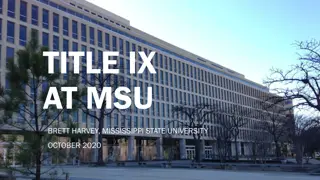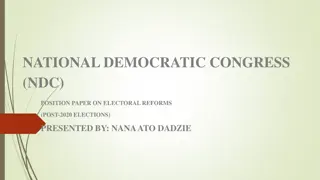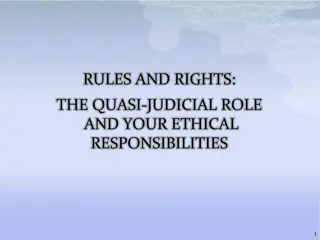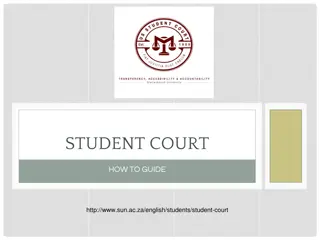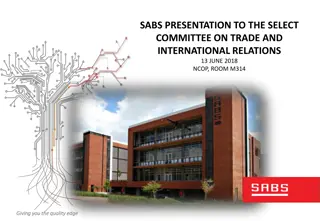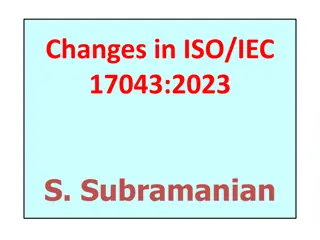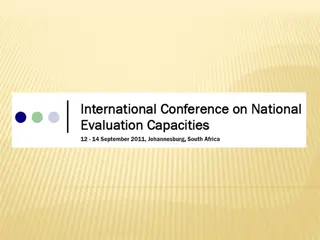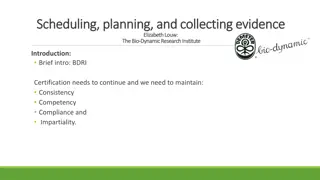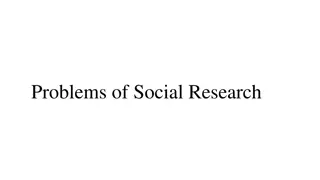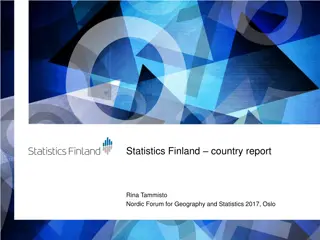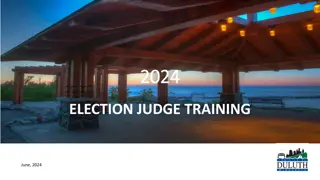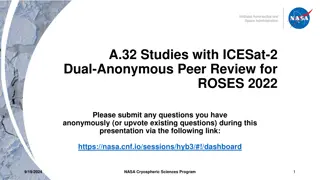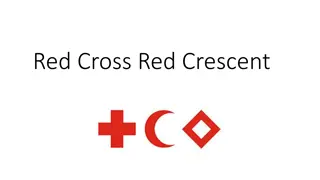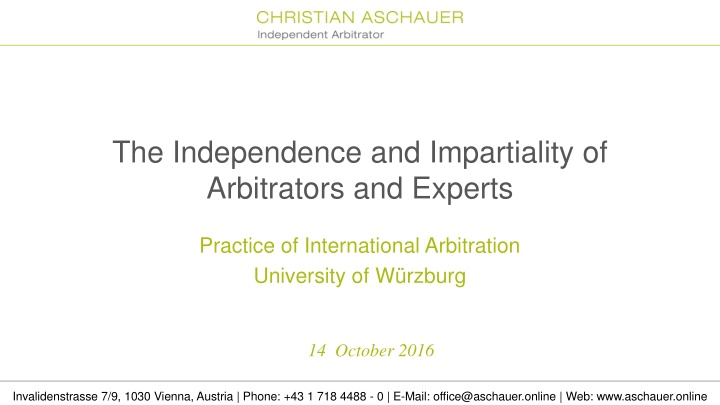
Independence and Impartiality of Arbitrators in International Arbitration Practice
Explore the differences between the roles of judges and arbitrators, understand the authority and standards that govern arbitrators' independence and impartiality, and discover why arbiters must adhere to higher standards than state court judges. Delve into statutory and agreed standards for arbitrators, shedding light on the essential principles of international arbitration.
Uploaded on | 6 Views
Download Presentation

Please find below an Image/Link to download the presentation.
The content on the website is provided AS IS for your information and personal use only. It may not be sold, licensed, or shared on other websites without obtaining consent from the author. If you encounter any issues during the download, it is possible that the publisher has removed the file from their server.
You are allowed to download the files provided on this website for personal or commercial use, subject to the condition that they are used lawfully. All files are the property of their respective owners.
The content on the website is provided AS IS for your information and personal use only. It may not be sold, licensed, or shared on other websites without obtaining consent from the author.
E N D
Presentation Transcript
The Independence and Impartiality of Arbitrators and Experts Practice of International Arbitration University of W rzburg 14 October 2016 Invalidenstrasse 7/9, 1030 Vienna, Austria | Phone: +43 1 718 4488 - 0 | E-Mail: office@aschauer.online | Web: www.aschauer.online
I. Introduction a) The standing of judges as opposed to the standing of arbitrators Judges are irremovable from office Judges have a fixed income Judges have (usually) no other occupations Arbitrators are appointed on a case-by-case basis Arbitrators are remunerated on a case-by-case basis Arbitrators are also party representatives / partners of international law firms / university professors 13.04.2025
I. Introduction b) The authority of arbitrators as opposed to the authority of judges No appeal against the decision of the arbitral tribunal Discretion of the arbitral tribunal to decide procedural matters (Art 19 ICC Rules; Art. 7.8 of the CAM-CCBC Arbitration Rules: The Arbitral Tribunal will adopt the necessary and convenient measures for the appropriate conduct of the proceedings, observing the right to fully defend oneself and the right to dispute the allegations of the other party, as well as the equal treatment of the parties. ) 13.04.2025
I. Introduction c) Conclusions: It is not appropriate to apply standards that are effective for state court judges with regard to arbitrators Arbitrators must be even more independent and impartial than state court judges 13.04.2025
II. Standards of independence and impartiality for arbitrators a) Statutory standards Sect. 12(2) UNCITRAL Model Law = Sect. 1036(2) German CPC: An arbitrator may be challenged only if circumstances exist that give rise to justifiable doubts as to his impartiality or independence, or if he does not possess qualifications agreed to by the parties Nacimiento/Abt/Stein in B ckstiegel: independence is understood as an objective criterion for the connection of the arbitrator to the parties and impartiality as a subjective criterion for the mental attitude of the arbitrator to the case to be decided 13.04.2025
II. Standards of independence and impartiality for arbitrators b) Standards agreed by the Parties Art. 11(1) ICC Arbitration Rules: Every arbitrator must be and remain impartial and independent of the parties involved in the arbitration. Art. 13(5) ICC Arbitration Rules: The sole arbitrator or the president of the arbitral tribunal shall be of a nationality other than those of the parties. 13.04.2025
II. Standards of independence and impartiality for arbitrators b) Standards agreed by the Parties (continued) Art. 5(2) CAM-CCBC Arbitration Rules: 5.2. A person cannot be appointed as an arbitrator if he or she: (a) Is a party to the dispute; (b) Has participated in the resolution of the dispute as legal representative for one of the parties before a judicial authority, testified as a witness, served as an expert or presented an opinion; (c) Is a spouse or relative, whether by blood or marriage, as an ancestor, descendent or collaterally, to the third degree, of one of the parties; (d) Is a spouse or relative, whether by blood or marriage, as an ancestor, descendent or collaterally, to the second-degree, of the attorney or representative of one of the parties; (e) Participates in a management or administrative body of a corporate entity that is a party to the litigation or is a shareholder or partner; (f) Is a personal friend or enemy of one of the parties; (g) Is a creditor or debtor of one of the parties or of his or her spouse or of relatives, whether ancestors, descendents or collaterally, to the third degree; 13.04.2025
II. Standards of independence and impartiality for arbitrators b) Standards agreed by the Parties Art. 5(2) CAM-CCBC Arbitration Rules (continued): (h) Is a presumptive heir, legatee, employer or employee of one of the parties; (i) Receives gifts before or after the dispute begins, advises one of the parties regarding the subject matter of the case or provides funds to cover the expenses of the proceedings; (j) Has a direct or indirect interest in the decision of the dispute in favor of one of the parties; (k) Has served as a mediator or conciliator in the dispute before the commencement of arbitration, unless expressly agreed to by the parties; (l) Has an economic interest related to any of the parties or their lawyers, unless there is express agreement of all parties. 13.04.2025
II. Standards of independence and impartiality for arbitrators c) Soft Law 1. 2014 IBA Guidelines on Conflicts of Interest in International Arbitration Reflect the understanding of the IBA Arbitration Committee as to the best current practice Are not legal provisions and do not override any national law Do not purport to be exhaustive Non-Waivable Red List: no person can be his or her own judge, cannot be cured Waivable Red List: serious, but can be waived by an express declaration Orange List: still under a duty to disclose, but can be waived by implication (no objection) Green List: no disclosure required 13.04.2025
II. Standards of independence and impartiality for arbitrators c) Soft Law 2. 3.3 Any current direct or indirect business relationship between an arbitrator and a party, or with a person who is known to be a potentially important witness, will normally give rise to justifiable doubts as to a prospective arbitrator's impartiality or independence. [ ] Examples of indirect relationships are where a member of the prospective arbitrator's family, his firm, or any business partner has a business relationship with one of the parties. 3.4 Past business relationships will not operate as an absolute bar to acceptance of appointment, unless they are of such magnitude or nature as to be likely to affect a prospective arbitrator's judgment. 3.5 Continuous and substantial social or professional relationships between a prospective arbitrator and a party, or with a person who is known to be a potentially important witness in the arbitration, will normally give rise to justifiable doubts as to the impartiality or independence of a prospective arbitrator. 1987 IBA Rules of Ethics for International Arbitrators 13.04.2025
II. Standards of independence and impartiality for arbitrators d) Duty of Disclosure 1. Statutory Law 2. Agreed rules of arbitration 3. Soft law 4. No liability privilege 13.04.2025
II. Standards of independence and impartiality for arbitrators 5. Example of disclosure 13.04.2025
II. Standards of independence and impartiality for arbitrators e) Different standards for party-appointed arbitrators? The role of party appointed arbitrators as opposed to the role of the president The law does not distinguish / the rules do not distinguish f) Different standards at the beginning / towards the end of the arbitration? Removal of the arbitrator at the beginning / towards the end of the arbitration The law does not distinguish / the rules do not distinguish 13.04.2025
III. Legal remedies to safeguard the independence and impartiality of arbitrators a) Challenge of the arbitrator Ad hoc arbitration: Sect. 13(2) UNCITRAL Model Law = Sect. 1037(2) German CPC: 14 days/2 weeks decision of the arbitral tribunal (including the challenged arbitrator) UNCITRAL arbitral proceedings: Art. 15 UNCITRAL Arbitration Rules: 15 days decision of the appointing authority Institutional arbitral proceedings: Art 14 ICC Rules: 30 days decision of the ICC Court of Arbitration Art. 5(4) CAM-CCBC Arbitration Rules: 15 days decision of Special Committee of 3 arbitrators appointed by the President of the CAM-CCBC 13.04.2025
III. Legal remedies to safeguard the independence and impartiality of arbitrators b) Review of the decision on the challenge by the state courts Section 1037(3) German CPC: if the challenge is not successful, appeal to the Higher Regional Court ( Oberlandesgericht ) Section 589(2) Austrian CPC: if the challenge is not successful, appeal to the Supreme Court ( Oberster Gerichtshof ) If the appeal is also not successful, no further remedy in the country where the award was made 13.04.2025
III. Legal remedies to safeguard the independence and impartiality of arbitrators c) Setting aside of the award (if the party becomes aware of the lack of independence and impartiality after the notification of the award) EXAMPLE I: Swiss Federal Court, 7 September 2016, no. 4A_386/2015 23 April 2015: final award 8 July 2015: l'un des trois conseils qui l'avaient assist e durant la proc dure arbitrale a d couvert un communiqu de presse, datant du 5 d cembre 2014, par lequel le cabinet juridique et fiscal allemand A.________-A portait la connaissance du public, sous le titre " Z.________ advised on e-mobility by A.________ ", qu'il avait conseill la soci t de droit allemand Z.________ GmbH (ci-apr s: Z.________), Berlin, autre soci t du Groupe Y.________, dans la mise en oeuvre d'un projet relatif une application pour t l phones portables destin e aux conducteurs de voitures lectriques. Selon la requ rante, ce lien entre l' tude A.________ et une soci t appartenant au m me groupe que celle qui avait d pos la requ te d'arbitrage e t constitu un motif de r cusation, respectivement de recours contre la sentence, si elle en avait appris l'existence pendente lite ou, du moins, avant l'expiration du d lai de recours. Aussi justifie-t-il, ses yeux, la mise en oeuvre d'une proc dure de r vision.. 13.04.2025
III. Legal remedies to safeguard the independence and impartiality of arbitrators EXAMPLE I continued: Swiss Federal Court, 7 September 2016, no. 4A_386/2015 (continued) Defence of the arbitrator: The law firm was not integrated, partners did not share revenues He was not aware of the conflict Decision of the Swiss Federal Court: S curit du droit legal certainty In principle, the setting aside can be warrented even if the reason for the challenge was only found after the notication of the award The IBA Rules can be used as a guideline to assess the gravity of the conflict In actuality, the partners did not form one integrated office The arbitrator was appointed by the ICC Court, not party-appointed les circonstances du cas concret, seules d cisives, ne sont de toute fa on pas d'une gravit telle que le maintien de la sentence formant l'objet de la demande de r vision appara trait incompatible avec le sentiment de la justice et de l' quit . 13.04.2025
III. Legal remedies to safeguard independence and impartiality of arbitrators d) Refusal to recognize and enforce the award Art. V(1)(d) New York Convention: The composition of the arbitral authority or the arbitral procedure was not in accordance with the agreement of the parties Art. V(2)(b) New York Convention: The recognition or enforcement of the award would be contrary to the public policy of that country 13.04.2025
IV. Further examples a) EXAMPLE II: Supreme Court of Austria, 18 ONc 1/14p and 18 ONc 2/14k b) EXAMPLE III: Supreme Court of Austria, 18 ONc 3/15h 13.04.2025
VI. Independence and Impartiality of Experts a) Party appointed experts vs. Tribunal appointed experts b) Challenge of tribunal-appointed experts c) Duty of party-appointed experts to disclose links with their parties d) Evaluation of evidence e) Example IV: The university professor 13.04.2025

